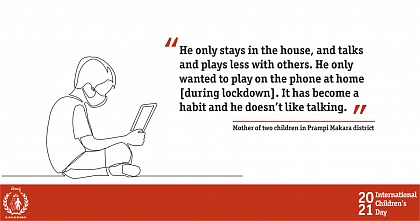Children Must Not Be Left Behind in Cambodia’s Response to COVID-19
Published on 1 June 2021The government must begin treating children’s rights and well-being as a central issue in its ongoing efforts to contain the pandemic. Children’s lives have been radically altered by the extended closure of all in-person learning and drastic lockdown measures, and more must be done to support and defend their rights and needs.
This Children’s Day, LICADHO is releasing a series of quotes from children and their families whose lives have been impacted by the response to COVID-19. They have decided to share their experiences and detail how measures to contain the pandemic have affected their education, as well as their physical and mental health, particularly for children caught in harsh lockdowns.
The rights, well-being and voices of children must be a key priority in all responses to COVID-19 in Cambodia
Am Sam Ath, Deputy Director of Monitoring at LICADHO
“Children’s needs can no longer be an afterthought”, said Am Sam Ath, deputy director of monitoring at LICADHO. “The rights, well-being and voices of children must be a key priority in all responses to COVID-19 in Cambodia.”
For more than a year, around 3.2 million Cambodian students have faced prolonged school closures. Classrooms across the country remain empty because of nationwide restrictions, regardless of the risk of COVID-19 transmission in a particular area. Schools were first closed in March 2020, and since then have largely remained closed and only been opened for short periods of time, with the latest closures announced after the “February 20” outbreak of COVID-19. As the country is re-opening, the status of school closures has not changed or been publicly addressed by the government.
School closures have not impacted all children equally. Children from poorer families, schools with fewer resources, and those living in rural areas have been left without adequate and fair access to education. Paper-based learning materials have not reached all children, and without smartphones, computers, conducive workspaces and reliable internet, meaningful distance learning is impossible for many children, especially those at public schools. Parents and caregivers have also been placed under excessive strain, with many lacking the knowledge, time or resources to meaningfully support their children’s education at home. Essential equipment and support have become difficult to afford for many families who have faced plummeting incomes during COVID-19.
In March 2021, the Ministry of Education, Youth and Sport (MoEYS), in collaboration with the Education Sector Working Group and other organisations, released an education sector needs assessment which details glaring inequalities in access to education during the pandemic. Nearly one-third - 30% - of students surveyed had not used any form of distance learning, including paper-based materials, online content, or national television broadcasts. And of the 70% of students who did have access to distance learning, more than one-third spent less than an hour a week engaged in learning activities.
This has created an environment for growing school drop-out rates and child labour. Children – particularly girls - also report contributing more time to household chores since school closures. The MoEYS analysis reveals that at least 16% of students were at-risk of dropping out and 6% were now working full time as a result of school closures.
Her father borrowed money to pay for her school fees … we had to suspend our son’s study because we don’t have money to pay his school fees
“We decided to let our older daughter continue her studies, but only Khmer language”, said a mother of two children, aged 10 and 6 years. “So, her father borrowed money to pay for her school fees … we had to suspend our son’s study because we don’t have money to pay his school fees.”
In addition to school closures, harsh lockdowns in many areas have led to children lacking access to nutritious food and essential items. Access to routine healthcare - such as vaccinations and maternal health - has been disrupted or delayed.
Children’s stress, fear and anxiety have grown as they have been confined to their homes and confronted with the unknowns of a global pandemic. According to the MoEYS assessment, one in five children self-reported that they are at additional risk of violence, abuse or exploitation. At the height of Cambodia’s lockdowns, many children witnessed intimidating, heavily armed security presences in their neighbourhoods. Many have also been confined to cramped housing without basic amenities. These interruptions to play, social interactions and healthy development have taken place largely without any widespread access to psychosocial support.
Meanwhile, over a thousand child prisoners and children living with their mothers in detention face not only these risks, but also the dire risk of a COVID-19 outbreak in Cambodia’s disastrously overcrowded prisons.
As Cambodia continues to grapple with COVID-19, children’s rights must be an urgent priority. We urge the government and all relevant stakeholders to put children’s rights and needs at the centre of all responses to COVID-19, and ensure that no child is left behind. Children must enjoy equal access to quality education, have access to essential support and services, and parents and caregivers must be given the social and financial support they need for their children’s well-being throughout the pandemic.
For more information, please contact:
▪ Mr Am Sam Ath, deputy director of monitoring at LICADHO, on Signal at +85510327770 (Khmer)
▪ Mr Mao Sopanha, advocacy manager of LICADHO, on Signal at +85589910115 (English)
PDF: Download full statement in English - Download full statement in Khmer
- Related
- Topics
- Children's Rights








